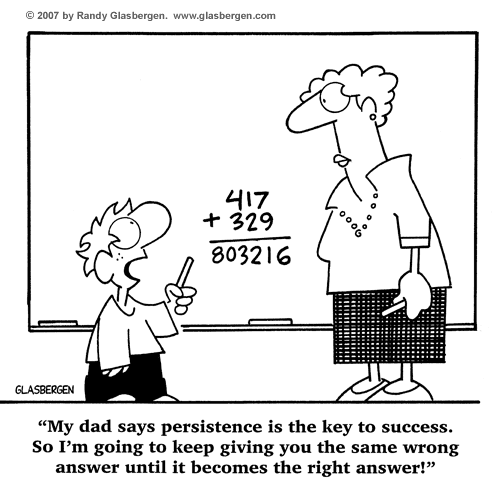
If you've been following my blog, you probably know that my daughter swims competitively for a year-round club team, and like most sports these days, it's a confusing world, probably made even more so by a sport that is more individual than team oriented and leads you on a continual race down the proverbial rabbit hole. In swimming, you compete against your "teammates" while still trying to be "teammates" and you reach one qualifier time only to immediately feel pressured to make another one. Time is never on your side, so to speak , as you are always chasing it. In other words, satisfaction is pretty fleeting and inconsistent as you aren't always faster in every race; in fact, sometimes you slow down before you speed up.
In other words, in many ways, it is an early introduction to the rat race.
As a parent trying to guide a young child, who enjoys swimming but can get overwhelmed by the competition side of it at times, you get to see lots of different approaches to achieving "success" (often called "excellence" in the world of sports), and after devoting countless hours to sitting in a hot, humid pool area on hard bleachers, I've noticed a lot of things about human nature (including sadly my own) that I also see when it comes to our professional lives.
And all of them result in this tendency for us to chase after the "low-hanging fruit" that makes the rat race, well, the rat race.
Here are some observations:
1. We talk long term, but we think (and act) short term. In other words, we often say one thing (what we long for) and do another (often what we think is expected of us). For instance, we say we don't care about fame and fortune, but then we exhaust a lot of effort reaching for it. Or vice versa. We say we deserve a better work-life balance, but then we're not willing to make the sacrifices it takes to get that. So although we say we want one thing, for a variety of reasons (fear, expectations, an addiction to the rat race, etc.), we keep going for the low-hanging fruit either the path of least resistance or those things that will never satisfy. And then we say things like, "what else can you do?" (In competitive swimming, I see this a lot: We tell the kids that excellence comes from hard work and persistence, but what we really mean by our actions is that if they aren't in the pool every day, devoting every spare minute to chasing one qualifier time after another [work, work, work], they aren't committed to 'excellence.' My daughter is 10, by the way!)
2. We crave a team, but we like individual prizes too much. Much like in the world of sports, organizations love to talk about "teamwork" and building "excellence" within their "teams." And lately all this talk about cultural fit at our jobs really comes down to that sentiment. Now more than ever it seems we just want to "fit in" and be a part of something bigger (or in today's market, that's code for "innovative")...at least that's what we say. But in reality, when you really delve into what's ailing people in their current environments, it's lack of proper recognition (but it's a bit embarrassing to admit, so we use other language). We all want to feel more valued as individuals, and yes, we'd even like to win a prize sometimes...a cash prize, preferably (aka a raise, promotion, bonus).
3. We need constant positive reinforcement. Workplace studies are showing that this is especially true with younger professionals, but let's face it, we all like to hear it...a lot. And if we don't, we have this tendency to give up and run the other way, to settle for something else. Also, it's not just something we want to hear; we want to see it in action as well. If we don't see it in action (as well as hear it), admit it or not, it causes us to make more emotional choices when it comes to our careers.
4. We focus on the wrong things because they look and sound like (or seem like) they are more satisfying than the right things. The rat race is the rat race because it is, well, so alluring. If it weren't, we wouldn't get so caught up in it. And a big part of that allure is making us chase after things that seem satisfying but rarely are, at least for any lasting amount of time.
5. We don't really know what our goals are. For most of us, if we are honest, our "goals" are not deeply rooted. A slight shift in the atmosphere can send us off in another direction. An insensitive boss can erode our confidence, one bad experience can make us doubt, a negative market news report can get us re-assessing. Having flexibility with our goals is a good thing, but having goals that move with the wind is not. So if these observations have merit and they affect us all to different degrees, what do we do about them?
We fight against them.
That's what makes someone "excellent."
It's not long hours at work (or in my daughter's case, the pool) or a competitive desire to be better than the rest. Combined with talent, these things might make you improve, but they rarely make you unique, much less excellent. Excellence, whether it is in our careers, sports, or other rat race rabbit holes, comes out of being extraordinary, not ordinary, and that requires doing battle with probably the hardest opponent of all: our nature.
(Stay tuned...in Part II, we will go into more detail about this.)
No comments:
Post a Comment